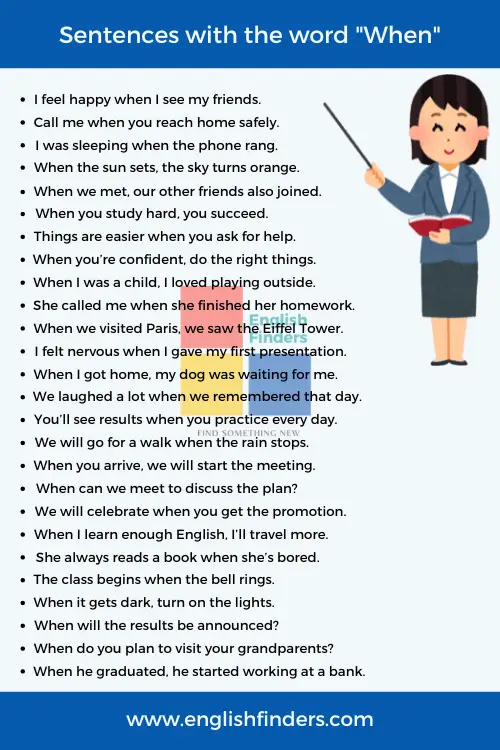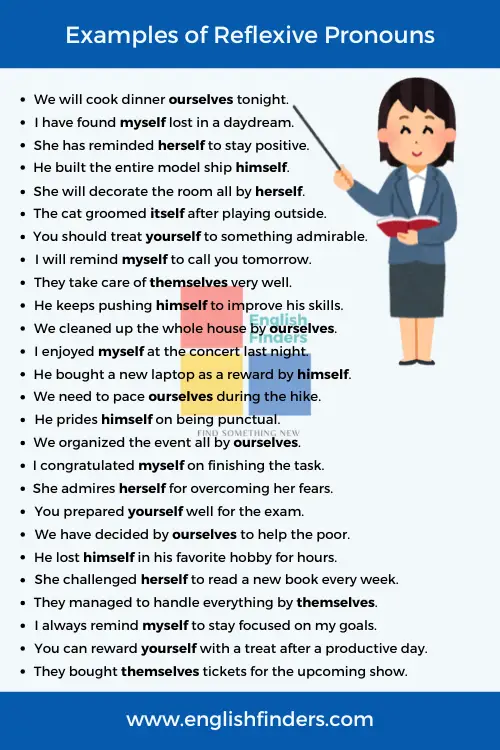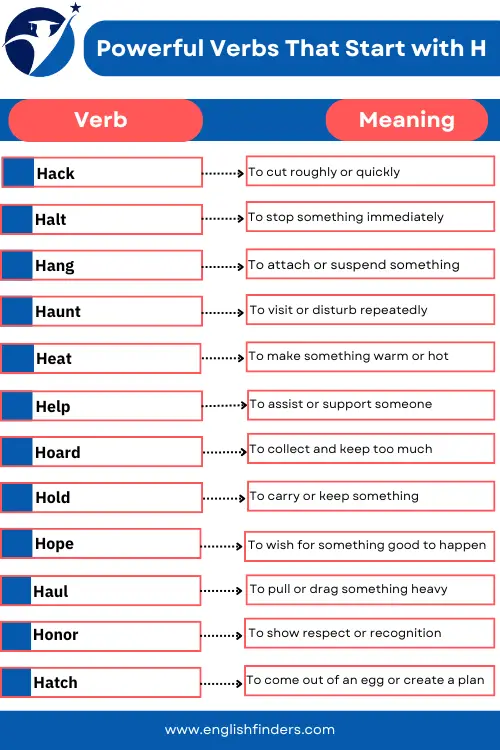Last updated on December 29th, 2024 at 10:43 am
Have you ever noticed how often we use the word “when” in everyday conversations? It’s one of those words that we almost can’t avoid because it helps us connect ideas, talk about time, and ask questions. It’s a small but powerful word that can change the meaning of a sentence entirely. In this lesson, we’ll walk you through what the word “when” refers to and how to use it in sentences. We will also provide you with 50 sentences of “when” so you can see exactly how it works in action.
What is “When” and How is it Used?
Quick Navigation
The word “when” can be used as a conjunction, adverb, or pronoun, and its main purpose is to talk about time. You’ll often use it to connect one event with another, whether you’re asking about when something happened or explaining when something will happen.
It’s an essential word for anyone who wants to improve English grammar skills, and knowing how to use it can really help you to make complex sentences easily.
50 Sentences of “When” In Different Usage
Let’s move on to the 50 helpful sentences with the word “when” in different usage.
Sentences of “When” to Talk About Time
These sentences show how “when” connects events or actions that happen at a certain time:
- I feel happy when I see my friends.
- We were watching TV when we got together.
- Call me when you reach home safely.
- I was sleeping when the phone rang.
- When the sun sets, the sky turns orange.
- She always reads a book when she’s bored.
- I will let you know when I am ready.
- The class begins when the bell rings.
- He was laughing when he tripped.
- When we met, our other friends also joined.
Sentences of “When” for Conditions
“When” can also be used to describe what happens if or whenever something else happens. Let’s look at some examples:
- When it rains, we stay indoors.
- When you study hard, you succeed.
- Things are easier when you ask for help.
- When the water boils, add the pasta.
- When I’m tired, I usually take a nap.
- When you’re confident, do the right things.
- It’s easier when you know the rules.
- When it gets dark, turn on the lights.
- When you feel uncomfortable, take a deep breath.
- I feel more productive when I’m organized.
Sentences of “When” for Past Events
“When” is great for talking about things that happened in the past. Here are a few examples:
- When I was a child, I loved playing outside.
- We moved to a new city when I was 10.
- She called me when she finished her homework.
- When we visited Paris, we saw the Eiffel Tower.
- I was in class when I heard the news.
- When he graduated, he started working at a bank.
- I felt nervous when I gave my first presentation.
- When I got home, my dog was waiting for me.
- We laughed a lot when we remembered that day.
- When I first tried sushi, I didn’t like it.
Sentences of “When” for Future Events
Sometimes, we want to talk about things that will happen. Here’s how you can do that with “when”:
- When I grow up, I want to be a doctor.
- Let’s meet when the movie ends.
- You’ll see results when you practice every day.
- We will go for a walk when the rain stops.
- I will visit you when I have time.
- When you arrive, we will start the meeting.
- When the new season starts, I will binge-watch it.
- I’ll be there when you need me.
- We will celebrate when you get the promotion.
- When I learn enough English, I’ll travel more.
Sentences of “When” for Questions
Finally, “when” is super helpful for asking about time. Let’s see some examples:
- When will you finish your project?
- When are we leaving for the trip?
- When did you learn how to swim?
- When do you usually wake up?
- When will the results be announced?
- When are you going to the dentist?
- When can we meet to discuss the plan?
- When did you start learning English?
- When do you plan to visit your grandparents?
- When will the next lesson be available?
Final Thoughts
Learning how to use the word “when” is an important step in improving your English. It helps you connect ideas, describe events, and ask questions with clarity. I encourage you to practice these 50 sentences and even come up with your own. With time, you’ll notice that using “when” becomes second nature, helping you communicate better and more confidently in English.

Azizul Hakim is the founder & CEO of englishfinders.com. He is a passionate writer, English instructor, and content creator. He has completed his graduation and post-graduation in English language and literature.




